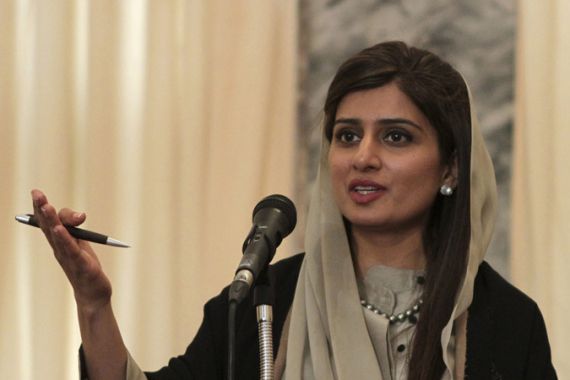Pakistan denies ‘intimate’ Taliban links
Leaked NATO report alleging ISI help for Afghan group overshadows Pakistan foreign minister’s visit to Kabul.

Pakistan has rejected as “frivolous” a leaked NATO report which claims that the country’s security services are helping the Taliban, and suggesting that the group believes it is poised to regain power.
The leaking of the report comes as Hina Rabbani Khar, the Pakistan foreign minister, visits Kabul for talks aimed at improving strained relations between the neighbours.
Speaking after talks on Wednesday with Hamid Karzai, the Afghan president, Khar said: “We can disregard this [report] as a potentially strategic leak … this is old wine in an even older bottle.”
The report, titled State of the Taliban: Detainee Perspectives, is derived from thousands of interrogations and alleges that Pakistan knows the locations of senior Taliban leaders.
It claims that Pakistan’s ISI intelligence agency is “intimately involved” in the Taliban’s campaign against Afghan forces and its international allies, and that the Taliban assumed their victory would be inevitable once US and multinational forces left the country in 2014.
Khar, whose one-day diplomatic visit was dubbed a “new co-operation phase” by Afghan officials, said: “We have no hidden agenda in Afghanistan.
“These claims have been made many, many times. Pakistan stands behind any initiative that the Afghan government takes for peace”.
Contrasting views
While allegations that Pakistan’s security services are helping the Taliban have been repeatedly made, the timing of the report’s leak, initially reported by the BBC and the UK’s Times newspaper, appeared to place fresh strain on already fractured diplomatic ties.
A Pakistani foreign ministry spokesman denied the allegations and played down the report’s significance.
| Pakistani analyst Talat Masood discusses the leaked report |
“This is frivolous, to put it mildly. We are committed to non-interference in Afghanistan and expect all other states to strictly adhere to this principle,” Abdul Basit, the spokesman, said
However, Daoud Sultanzoy, a former Afghan legislator, said the “ugly truth” about Pakistan’s relationship with the Taliban does not come as news to Afghans.
Speaking to Al Jazeera from Kabul, he said: “From president to peasant, we have been talking about this for a very long time. The people of Afghanistan have been grappling with this debilitating problem for many many years.”
“The Taliban is not commanding its troops from Mars, they’re sitting somewhere. And no matter where they sit in Pakistan, it would be a joke to say that Pakistani intelligence doesn’t know about them.”
Besides Karzai, Khar met her Afghan counterpart, Zalmai Rasoul, on Wednesday amid tentative moves towards negotiations in Qatar involving the US and the Taliban, which was removed from power by a 2001 US-led invasion.
Karzai has given a lukewarm welcome to the Taliban opening a political office in the Gulf state, but is wary of being sidelined and has insisted that his government should have a central role in any peace talks.
Taliban denial
The Taliban chose the same day as the meeting in Kabul to deny that it would hold talks with Karzai’s government in Saudi Arabia.
“There is no truth in these published reports saying that the delegation of the Islamic Emirate would meet with representatives of the Karzai government in Saudi Arabia in the near future,” the Taliban said on its website.
Afghan officials had suggested that talks in Saudi Arabia would be in addition to contacts in Qatar between the Taliban and the US.
Wednesday’s talks between the Pakistani and Afghan sides took place despite a freeze in bilateral and trilateral meetings [involving also the US] since the assassination last September of Afghanistan’s chief peace negotiator, Burhanuddin Rabbani, which one Afghan minister blamed on Pakistani spies.
Pakistan boycotted a major conference in Germany in December on the future of Afghanistan to protest against a cross-border US air raid that killed 24 Pakistani soldiers on November 26. It also closed down the crucial supply routes that NATO forces uses.